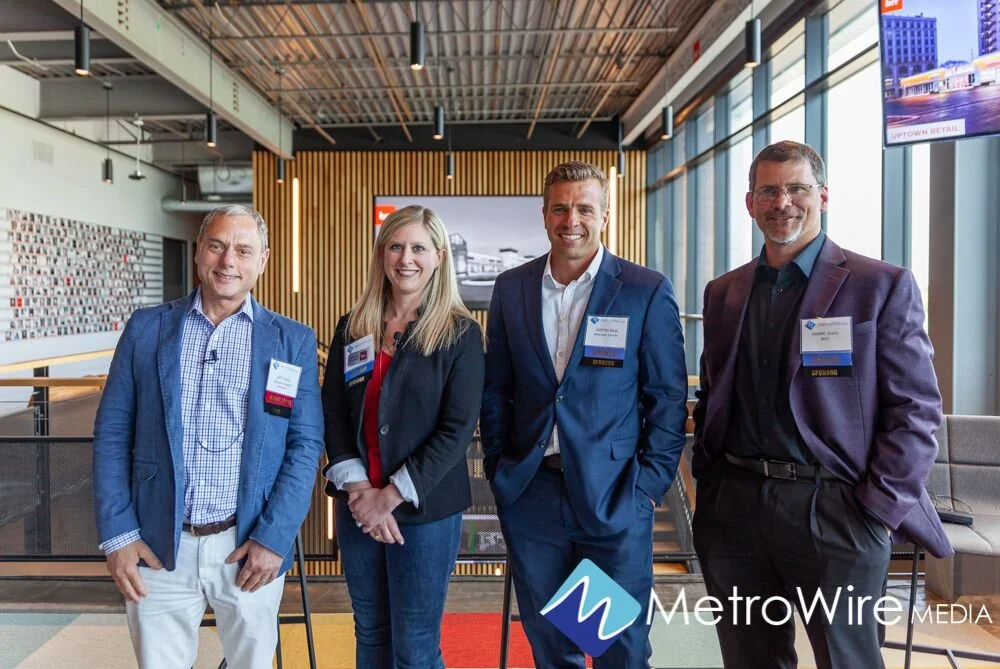Photo credit: Arch Photo KC/Jacia Phillips
Peer cities look to KC during market challenges
Chris Robertson, CCIM, managing director - investment sales and capital markets at Newmark Grubb Zimmer, joined moderator Frank Sciara, CCIM, president of the Kansas City CCIM chapter and vice president with Grandbridge Real Estate Capital, last week for a live webinar discussion sponsored by the local CCIM chapter to discuss the current local investment sales market.
Robertson noted that there has been a decrease of approximately 20 to 25% in volume as of the end of the second quarter as compared to the same period in 2019. But, Robertson remains optimistic about the market going forward over the next six to twelve months.
“It seems like ever since the Fourth of July, somebody flipped a switch and everybody’s been busy and it seems like people are starting to get out and tour properties,” Robertson said.
Robertson has received calls from and is working with groups from some peer cities such as Nashville, Minneapolis, Denver and Indianapolis, as well as groups from Utah, California and New York, who are looking to markets like Kansas City trying to find additional yield.
Robertson said that these investors are finding a 50 to 150 basis point premium to what they are seeing in their markets, particularly the markets on the east and west coasts.
“This might be odd to say, but I think COVID will ultimately help continue to drive demand to some of our more stable midwestern markets like Kansas City where you don’t see a lot of fluctuations in valuations,” said Robertson.
Robertson discussed the effect of COVID-19 on the cap rates of the various property types.
He said that there is still quite a bit of price discovery with regard to the retail segment because “no one knows what that sector is going to look like long-term.”
However, he said there are a few bright spots in retail, noting that single tenant, long-term investments in essential services (eg., Dollar General, CVS, Walgreens) are doing well for investors seeking stability and quality credit tenants.
“And in some of those cases, we’ve actually seen cap rates compress slightly just because there’s not a lot of product on the market and those are in high demand,” said Robertson.
Robertson said office has seem some good activity, primarily stabilized long-term assets in good locations with a good weighted average lease term. He noted that 9300 and 9400 Ward Parkway sold to a New York-based group during the pandemic for $121 million at a 7.32 cap rate.
Robertson said the industrial market remains “red hot,” with significant demand both locally and nationally, while multifamily remains competitive, without any major shifts in cap rates. Uncertainty remains in the hospitality market as investors are trying to determine what pricing is going to look like as occupancies start bounce back.
“We’ve seen a lot of the large players come into Kansas City looking for larger portfolios of assets. We’ve had calls from groups in Israel and Canada looking to place funds here in Kansas City as they’ve taken note of the absorption numbers and the amount of new development we’ve had here in Kansas City,” said Robertson.
Industrial market flying smoothly through 2020 turbulence
Despite the economic turbulence COVID-19 has unleashed on 2020, the industrial real estate market seems to have buckled in for a relatively smooth ride, according to a recent CCIM KC panel.
Brent Miles, chief marketing officer and founding partner of NorthPoint Development and Joe Orscheim, SIOR, CCIM, senior vice president of CBRE, joined moderator Ben Boyd, CCIM Kansas City director of programs and vice president of Colliers International, for a webinar discussion last Friday about the state of the industrial market.
Both Miles and Orschein agreed that e-commerce is the major driver strengthening the industrial market as online shopping has exploded during the pandemic. Miles noted that increased demand for industrial space for companies like Amazon and Chewy is COVID-related, but he thinks the expansion represents a permanent change.
“They are the infrastructure and the plumbing of how we’re getting goods,” Miles said.
According to Miles, NorthPoint Development, which owns approximately 75 million square feet of industrial properties across the United States, saw only about 5 percent of its clients request and receive rent relief.
Orschein said he anticipated more requests from tenants for rent abatement than actually were made. Landlords, he said, used the requests as an opportunity to obtain updated financials, and in some instances, to extend the lease term by the number of months they abated rent.
“It was good for both parties. It’s always good for a landlord to show that they’re looking out for their customer and obviously they want them to be financially strong so the project remains successful,” Orschein said.
Miles said that availability of labor remains a concern in the industrial market, with uncertainty about how future stimulus or bailout legislation will affect unemployment and labor.
Orschein noted that there is a challenge to find “really good tracts that are ready to go” in the Kansas City area in order to satisfy demand. “We’re getting weekly calls from out of town developers and capital sources that are looking to land here in Kansas City, and we just need more land. We’ve got to figure it out. There’s strong demand, and we’re not seeing any kind of a slowdown so we’re encouraging everyone to just keep putting them up and we’ll all fill them,” said Orschein.
Orschein also noted that rental rates in the Kansas City industrial market are “pretty steady and level” and that he is seeing lower cap rates. He anticipates that the local industrial market will see one or two big institutional players enter by the end of the year.
“Everybody is taking note of Kansas City,” Orschein said.
According to Orschein, there is strong demand for industrial space for the food industry; however, the challenge is to figure out food requirements and freezer cooler needs.
“It’s obviously very expensive and highly specialized, but the need is there. We’ve just got to figure it out in Kansas City. In the industrial world, it seems like after the first couple of weeks of COVID hitting, it’s like everybody just got on the same page and said let’s all get back to work and keep the train moving,” Orschein said.






